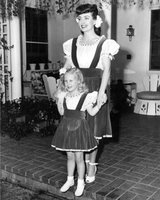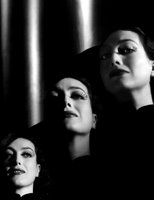Pamela's Nite
 Nasty review from Scott Weinberg via Apollo:
Nasty review from Scott Weinberg via Apollo:
Based loosely upon an already unreliable source (the sour grapes novel written by Christina Crawford mere months after her adopted mother’s death), Mommie Dearest offers a series of barely related sequences, most of them having to do with child abuse, an egomaniacal psychopath of a woman and alcohol. Rarely has the Hollywood machine cannibalized its own kind as sickeningly as this film does. Joan Crawford may have been a sick woman who physically abused her children, but I doubt she was as one-dimensionally evil as portrayed in this unintentional farce.
For fans of cinematic superlatives, Mommie Dearest is worth a look. Faye Dunaway delivers one of the most over-the-top and manic performances ever caught on celluloid, while every other actor onscreen wisely steps back and watches the carnage. The infamous “no more wire hangers!” sequence is a perfect example of what this campy dreck is all about. But there are at least seven or eight other scenes that match the depravity of that well-remembered outburst. Lacking any real story line, the interminable running time is instead littered with sordid tales of Crawford’s cruelty, egomania, ignorance and overall unpleasantness.
Great observation from Hal Erickson, All Movie Guide:
 Surprisingly, one emerges from Mommie Dearest with more sympathy for the monstrous but intensely vulnerable Crawford than for her whining daughter (played as an adult by Diana Scarwid, and as a child by Mara Hobel). Our favorite scene: Joan Crawford dazedly replacing her ailing daughter in the cast of a daytime TV soap opera.
Surprisingly, one emerges from Mommie Dearest with more sympathy for the monstrous but intensely vulnerable Crawford than for her whining daughter (played as an adult by Diana Scarwid, and as a child by Mara Hobel). Our favorite scene: Joan Crawford dazedly replacing her ailing daughter in the cast of a daytime TV soap opera.
Roger Ebert (via Roger Ebert):
In scene after scene, we are invited to watch as Joan Crawford screams at Christina, chops her hair with scissors, beats her with a wire coat hanger and, on an especially bad day, tackles her across an end table, hurls her to the carpet, bangs her head against the floor, and tries to choke her to death. Who wants to watch this?
 This material is presented essentially as sensationalism. The movie makes no attempt to draw psychological insights from the life of its Joan CrawfordÑnot even through the shorthand Freudianism much beloved by Hollywood. Mommie is a monster, that's all, and there's some mention of her unhappy childhood. Christina is a brave, smiling, pretty, long-suffering dope who might inspire more sympathy if she were not directed (in both her childhood and adult versions) to be distant and veiled.
This material is presented essentially as sensationalism. The movie makes no attempt to draw psychological insights from the life of its Joan CrawfordÑnot even through the shorthand Freudianism much beloved by Hollywood. Mommie is a monster, that's all, and there's some mention of her unhappy childhood. Christina is a brave, smiling, pretty, long-suffering dope who might inspire more sympathy if she were not directed (in both her childhood and adult versions) to be distant and veiled.
Nasty review from Scott Weinberg via Apollo:
Surprisingly, one emerges from Mommie Dearest with more sympathy for the monstrous but intensely vulnerable Crawford than for her whining daughter (played as an adult by Diana Scarwid, and as a child by Mara Hobel). Our favorite scene: Joan Crawford dazedly replacing her ailing daughter in the cast of a daytime TV soap opera.
This material is presented essentially as sensationalism. The movie makes no attempt to draw psychological insights from the life of its Joan CrawfordÑnot even through the shorthand Freudianism much beloved by Hollywood. Mommie is a monster, that's all, and there's some mention of her unhappy childhood. Christina is a brave, smiling, pretty, long-suffering dope who might inspire more sympathy if she were not directed (in both her childhood and adult versions) to be distant and veiled.

